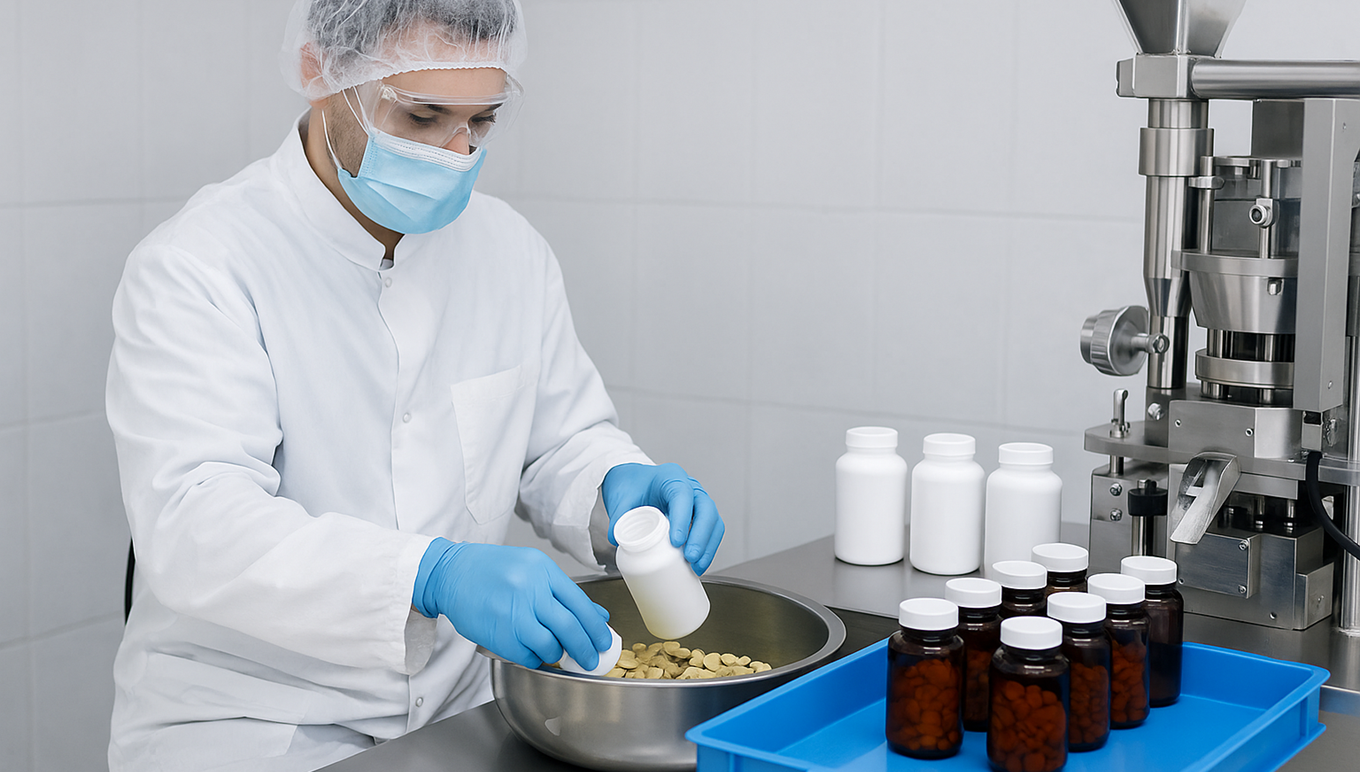How Approved Supplier Programs Strengthen Life Sciences Supply Chains
How Approved Supplier Programs Strengthen Life Sciences Supply Chains
How Approved Supplier Programs Strengthen Life Sciences Supply Chains
Jul 25, 2025
 Steve Reynolds | Senior Product Manager
Steve Reynolds | Senior Product Manager
In the life sciences industry, the quality of your supply chain is inseparable from the quality of your product. Whether you're producing dietary supplements, nutraceuticals, or cosmetics, supply chain missteps can result in compliance failures, product recalls or even risks to consumer health. A well-managed supply chain isn’t just efficient; it’s compliant, traceable and resilient.
At the core of a high-functioning life sciences supply chain is your approved supplier program. This foundational practice ensures that the raw materials, ingredients and components you rely on come from trusted, qualified sources. But beyond compliance, approved supplier management also supports broader goals like operational agility, risk mitigation and full traceability from source to shelf.
In this post, based on insights from our “ERP Perspectives” podcast, we’ll explore what makes a supplier “approved,” why this matters more in life sciences than many other industries and how industry-specific ERP technology can simplify and strengthen supplier oversight.
What Is an Approved Supplier?
While any vendor can sell you raw materials, approved suppliers are those who have undergone rigorous evaluation to prove they consistently meet your quality, safety and compliance standards.
Unlike general vendors, approved suppliers are audited, tested and regularly monitored to ensure their practices align with regulatory requirements like 21 CFR Part 111 in the U.S. or Health Canada's Natural Health Products Regulations. For many life sciences companies, this distinction isn’t just good practice, but rather a regulatory expectation.
Key Traits of an Approved Supplier
Verified certifications (e.g., ISO 9001, NSF-GMP, ISO 22716)
Clean regulatory history (no FDA warning letters or import alerts)
Proven material testing consistency
Documented and auditable quality processes
Ongoing performance tracking and scorecards
Why Approved Supplier Programs Matter
In industries where products are ingested or applied to the body, ingredient quality can literally be a matter of life and death. Approved supplier management is not optional. It's essential.
1. Consumer Safety Comes First
Substandard or contaminated ingredients can cause serious harm. For example, a well-known dietary supplement manufacturer suffered a large-scale recall after testing revealed heavy metal contamination in raw ingredients supplied by an unvetted vendor. Regulatory agencies moved quickly, and the brand’s reputation took years to recover.
2. Regulatory Agencies Demand It
In the U.S., the FDA’s current Good Manufacturing Practices (cGMPs) make it clear that companies are responsible for qualifying suppliers. Ultimately, you are responsible for verifying the accuracy of the product information you are presented by the supplier as part of a Certificate of Analysis (COA) or other compliance document.
In Canada, Health Canada places the burden of proof on manufacturers and importers to confirm the quality of their ingredients. Failure to do so can lead to penalties and product seizures.
3. It's the Foundation of Risk Management
Approved supplier programs are also central to managing risk. When issues arise, the ability to trace ingredients back to their source quickly can mean the difference between a controlled recall and a public relations disaster.
Building a Robust Approved Supplier Program: Best Practices
Whether you’re starting from scratch or revisiting an existing supplier qualification strategy, here’s a roadmap to help you build a best-in-class Approved Supplier List (ASL).
1. Start With Standard Operating Procedures (SOPs)
Before reaching out to any vendor, you need clear documentation. SOPs should outline:
How suppliers are identified and evaluated
What criteria must be met for approval
How audits are conducted
Processes for monitoring, disqualifying and re-approving suppliers
2. Establish Qualification Criteria
Key elements to evaluate include:
Certifications (e.g., ISO 9001 for supplements, ISO 22716 for cosmetics)
Compliance history (FDA or Health Canada flags)
Financial health and operational capacity
Consistency in on-time deliveries and meeting ingredient specifications
For contract manufacturers, also confirm their licenses and operating permits.
3. Perform Risk-Based Audits
Suppliers that carry higher risk, such as those providing active ingredients or dealing with hazardous materials, may require on-site audits, while others might qualify via desktop audits or document reviews.
4. Test and Validate Materials
Independent lab testing is essential. For dietary supplements, the FDA mandates identity testing for each lot. Cosmetic ingredients should be checked for purity and potential contaminants like heavy metals or microbial agents.
5. Formalize the Relationship With a Quality Agreement
Once approved, the supplier should sign a Quality Agreement outlining:
Testing responsibilities
Deviation protocols
Change notification procedures
Audit rights and intervals
6. Monitor Continuously
Supplier quality management goes beyond initial vendor onboarding. In life sciences, it’s a formal, ongoing process that monitors a supplier’s compliance with your GMP standards and quality protocols. You must continue to track each vendor’s:
On-time delivery
Quality performance
Communication responsiveness
You can use supplier scorecards and conduct regular business reviews to reinforce accountability and partnership.
When Things Go Wrong: Handling Non-Conformances
Even the best suppliers make mistakes. That’s why your SOPs should include procedures for addressing non-conforming materials.
Basic Response Workflow
Contain the issue: Quarantine affected lots
Investigate the root cause: Conduct a Corrective and Preventive Action (CAPA)
Communicate with the supplier: Demand transparency and documented remediation
Decide on consequences: Suspension, requalification or disqualification
Regulators expect you to not just identify issues but also show that you're addressing them proactively and permanently.
Beyond Compliance: Building Competitive Advantage
A great approved supplier program isn’t just about avoiding penalties. It’s about gaining supply security, improving speed to market and fostering innovation.
When you have a trusted network of high-performing suppliers, you’re better positioned to:
Launch new products faster
Experiment with new ingredients
React to market disruptions with confidence
In short, a strong approved supplier list is more than a compliance tool. It’s a strategic asset.
The Role of a Life Sciences ERP in Supplier Management
Trying to manage your life sciences supply chain manually is a recipe for inefficiency and risk. This is where enterprise resource planning (ERP) systems can make an enormous impact, but you’ll need one with specialized functionality designed for your industry challenges.
How ERP Strengthens Approved Supplier Programs
Centralized supplier data: Track all certifications, COAs and contact information in one place
Automated approvals: Set up workflows for supplier onboarding and role-based reviews (e.g., QA, legal)
Purchasing controls: Automatically block or flag purchases from non-approved suppliers
Document control: Store audit results, quality agreements and expiration dates for easy access during inspections
Lot traceability: Connect incoming raw material lots to finished goods for rapid recall response
Performance reporting: Generate scorecards and track metrics like on-time delivery, rejections and complaints
With the right life sciences ERP system, supplier qualification becomes an embedded process, not an ad hoc effort. It ensures that everyone from purchasing to QA to compliance is on the same page and working from the same data.
Streamline Your Approved Supplier Management With Aptean
When properly integrated into your supply chain strategy, a supplier quality management program ensures your external partners are held to the same standard you enforce internally. And with the right processes, technology and mindset, building and maintaining your approved supplier list doesn’t need to be an administrative chore.
If you're in the dietary supplement, nutraceutical or cosmetics space, now is the time to take a hard look at your supplier qualification practices and consider how a life sciences ERP solution can elevate them. As regulators, customers and partners continue to raise expectations, the companies that invest in supplier quality will be the ones best positioned for growth, compliance and trust.
That’s where Aptean comes in. Our specialized solution is developed by experts in the life sciences industry to solve your daily challenges with ease. With dedicated support teams, proven implementation processes and cloud-first deployment, you can be sure that your new ERP system will continue to grow with your business.
Want to learn more? Explore how Aptean can help you modernize your supplier management strategy with a demo of this functionality, or get in touch with our expert team for more information
Start transforming your supply chain today
If you’re ready to take your distribution business to the next level, we’d love to help.



